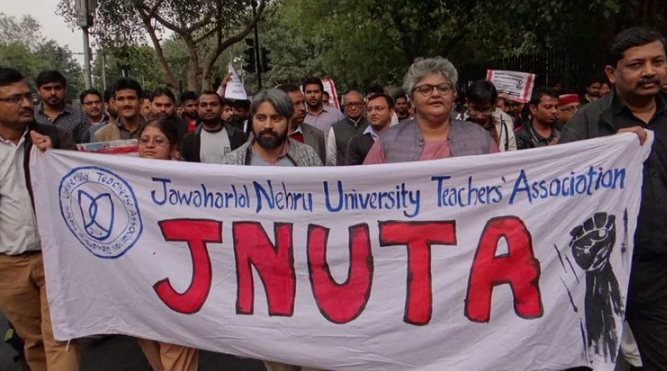
Stoking another controversy, Jawaharlal Nehru University on late Friday (July 26) evening served chargesheet to 48 teachers seeking explanation about their protest in July last year. The chargesheet, signed by the Vice Chancellor M Jagdesh Kumar, invoked Central Civil Services (CCS) Rules and directed teachers to “submit a written statement of defence within 15 days of the receipt of this Memorandum” or express their desire to be heard personally failing which they will be subject to 'ex-parte enquiry’.
The chargesheet further accused teachers of "violating Rule M-7(6) of the Academic Rules and Regulations that ban protests within the 100-metre radius.” Thus, the VC has instituted an inquiry under Rule 14 of the Central Civil Services (Classification, Control and Appeal) Rules, 1965."
The teachers had organised a two-day strike in July last year against "the repeated violations of the JNU Act and Statues, the bypassing of time-tested and established academic deliberative procedures, violations of reservation policy, arbitrary removal and appointment of chairpersons and Deans, the tripartite MOU with the UGC and MHRD, the proposed HEFA loan and the arbitrary enforcing of attendance”.
Following the protest, showcause notices were issued to the teachers and the matter was taken up for discussion in the executive council. It later formed a committee led by African Studies Professor Ajay Dubey to look into the alleged violations. In June this year, the executive council decided to issue a “chargesheet under major penalty” to the strikers based on the report submitted by Dubey. However, teachers argue that the report was not made available to them. A teacher, who was issued the chargesheet, requesting anonymity, said that the report has suspiciously been not shown to the teachers.
Launching a scathing attack against the latest move, Jawaharlal Nehru University Teachers’ Association, in a statement said that "they were vindictively targeted by the JNU administration for raising their voices against the misdeeds and mismanagement of the University."
Avinash Kumar, secretary of the JNUTA said that arbitrary targeting of 48 teachers is the latest in a chain of arbitrary disciplinary proceedings being initiated against individual teachers, with the sole goal of harassment and intimidation. He said, “Inquiries are announced on the flimsiest of pretexts and conducted without even the pretence of due process and guarantee of the principles of natural justice."
He added, "We must understand that we are not mere government employees who must execute their specified jobs, universities are a part of society — speaking up and acting for justice, reform, democratisation, and change is the role that academics must play if they are to give back to the society that created a space for learning, reflection, critique and the imagination."
Professor Atul Sood, President, JNUTA said that the latest chargesheet openly defies stated position of Ministry of Human Resources Development to the teaching community following a slew of protest over implementation of Central Civil Services Rules in central universities. In a tweet, then Human Resources Development Minister Prakash Javadekar had said, “We have neither put any restrictions nor intend to put any restriction on freedom of speech in JNU, Delhi University or any other University.”
He had added, “Teachers of JNU shall neither be intimidated nor silenced by the threats of the administration. Outlawing protest does not end protest, and only imbues it with another motivation, namely, the defense of the democratic right to protest.”
WHY ARE TEACHERS OPPOSING CCS RULES
The country witnessed a slew of protests after the centre tried to impose Central Civil Services Rules on the teaching community. The teachers maintained that the rules are not only antithetical to dissent but also affect research. Serious critique of many government policies like demonetisation to universal applicability of Aadhaar have come from academia.
Sood also maintained that invoking Central Civil Services Rules on the teaching community will have far reaching consequences. For Example Rule 8 (i), (ii) and Rule (9) of the rules state that “any intervention must not be of a nature that has the effect of an adverse criticism of the Government”. He said, “These rules have the effect of putting a blanket ban on freedom of speech and expression in the classroom, in research papers and articles, and in public life. In effect, they introduce censorship as a condition of service. Indian academics will not be able to engage in, and with, critiques of government policy, and will also not be able to fulfill their professional duties freely…..Rule 9 deprives teachers of the opportunity and moral obligation to inform and influence public opinion, an essential role of academia, and the chief way in which it can give back to society.”




